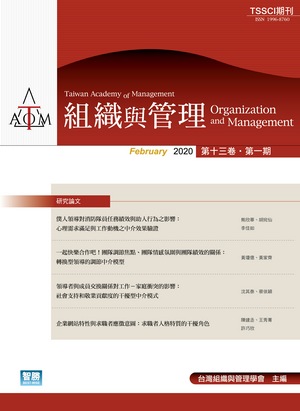Hot News
| 中文篇名 |
僕人領導對消防隊員任務績效與助人行為之影響:心理需求滿足與工作動機之中介效果驗證 | |
|---|---|---|
| 英文篇名 |
The Influences of Servant Leadership on Firefighters’ Task Performance and Helping Behavior: An Examination of the Mediating Effects of Psychological Need Satisfaction and Work Motivations | |
| 作者 | ||
| 中文摘要 |
本研究依據自我決定論,提出一理論模型,說明在消防團隊中僕人領導如何透過部屬基本心理需求滿足(包含自主需求、能力需求與關係需求之滿足)與自發性工作動機(包含內在動機與利社會動機)的序列中介,分別影響部屬的任務績效與助人行為。本研究以問卷調查方法蒐集主管與部屬配對資料,研究參與者為北部某消防局的77位消防主管與213位基層消防隊員。多層次資料分析結果顯示:一、僕人領導可透過能力需求滿足,提升部屬的內在動機,間接提升任務績效;二、僕人領導可透過能力與關係需求滿足,提升部屬的利社會動機,進而提升助人行為。依據結果本研究提出相關之理論與實務意涵,以及未來研究方向。 | |
| 英文摘要 |
Drawing on self-determination theory, this study proposed a theoretical model to describe how servant leadership influences subordinates’ task performance and helping behavior through the serial mediations of subordinates’ satisfaction of basic psychological needs (including autonomy, competence, and relatedness) and autonomous work motivations (including intrinsic motivation and prosocial motivation) in firefighter teams. We used survey method to collect supervisor-subordinate paired data. Our research participants were 77 team leaders and 213 frontline firefighters working in a city fire department of the Northern Taiwan. Results of multilevel data analysis revealed that: (1) servant leadership satisfied subordinates’ competence need and increased their intrinsic motivation, which advanced subordinates’ task performance; (2) servant leadership satisfied subordinates’ competence and relatedness needs and increased their prosocial motivation, which promoted subordinates’ helping behavior. On the basis of these results, the current study proposed relevant theoretical and practical implications, and provided future research directions. | |
| 關鍵詞 |
工作動機、任務績效、自我決定論、助人行為、僕人領導、work motivation、task performance、self-determination theory、helping behavior、servant leadership | |
| 刊名 | ||
| 期數 | ||
| 起訖頁 |
001-044 | |
| 出版單位 | ||
| DOI | ||
| QRCode |
| |
| 下一篇 |



